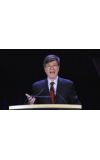
10 Nov 2011 10:39:20
"At the root of America's economic crisis lies a moral crisis: the decline of civic virtue among America's political and economic elite," Sachs, a professor at Columbia University and a special adviser to United Nations Secretary-General Ban Ki-moon, states at the outset of "The Price of Civilization."
Much of the polemical book, which calls on wealthier Americans to pay more taxes and lauds the more socially minded economic systems in Scandinavia, is a direct assault on the Tea Party and libertarian philosophy that have come to dominate the Republican Party in recent years.
No surprise there, as Sachs for years has been a vocal champion of the dispossessed throughout the world in his role as director of the Earth Institute at Columbia and through his columns, speeches and books.
Also, not surprisingly, the book has riled conservative critics for whom hiking taxes is anathema in today's politics.
"The book's veneer of economic analysis cannot conceal what is essentially a crusade against the free enterprise ethic of our republic," Wisconsin Republican Representative Paul Ryan wrote in a scathing review in The Wall Street Journal.
In the first half of the book, Sachs explains how he thinks the country got where it is today, with its mammoth budget deficits, dilapidated infrastructure, high unemployment and a population suffused with angry politics and consumerism.
"We have become like the rats that press a lever for instant pleasure, courting exhaustion and ultimately starvation," he writes.
A major culprit, in Sachs's view, was the Reagan administration's "incorrect diagnosis that 'big government' had caused the economic crises of the 1970s."
He says this resulted in tax cuts on higher incomes, restrained federal spending on civilian programs, deregulation of major industries and outsourcing of government services.
"The deepest political impact of the Reagan era was the demonization of taxes," he said.
Other targets of his ire: Wall Street, corporations, passive Democrats, and President Barack Obama.
"The Obama administration has been a government of continuity rather than change, as Wall Street, the lobbyists, and the military have remained at the center of American power and policy," Sachs writes in one of many passages critical of the Obama White House.
PRESCRIPTIONS FOR CHANGE
Sachs, whose previous books include "The End of Poverty" and "Common Wealth," supports his arguments with loads of data and citations ranging from opinion polls to philosophers.
The Buddha, he writes, "counseled us wisely about humanity's innate tendency to chase transient illusions rather than to keep our minds and lives focused on deeper, longer-term sources of well being."
Perhaps anticipating conservative critics like Ryan, Sachs repeatedly cites classic free-market advocates like Wilhelm Ropke, Milton Friedman and Friedrich Hayek for his arguments.
The latter two economists, along with John Maynard Keynes, Paul Samuelson and Adam Smith, Sachs writes, "were fully aware ... of the need for the government to be deeply engaged in public education, road building, scientific discovery, environmental protection, financial regulation and many other activities."
Sachs's prescriptions to get the U.S. out of its funk, if mostly of a liberal bent, have something for everybody.
He recommends a rise in public subsidies for unemployed young people to return to school; increased spending on infrastructure; ending the Bush tax cuts; and cutting the military's budget. But he also urges suspension of fiscal stimulus and the Fed's "quantitative easing" money policy.
"Monetary policy cannot solve America's employment problem," Sachs writes. "Temporary jobs in construction can be created through a Fed-led housing bubble, but when the bubble bursts we are left with the reality that America's manufacturing employment has fallen further under the weight of foreign competition and America's lack of global competitiveness.
"They are no solution for America's job crisis and threaten to destabilize the financial markets and undermine the country's long-term budget solvency," Sachs says.
Besides raising taxes on the wealthy, Sachs calls for a value-added tax and a tax on financial transactions, curbing tax evasion, and raising taxes on oil companies and banks.
As though to stress the fundamental nature of the country's current problems, Sachs also suggests addressing the political stalemates of the current day by reforming the Constitution "toward more parliamentarism, perhaps aiming toward a French-style mixed presidential-parliamentary system," with executive and legislative branches under a prime minister.
Such a system, he writes, would imbue politicians with a longer-term perspective of four to six years rather than the current two-year cycle, provide more proportional representation, and give more voting power to the poor.

